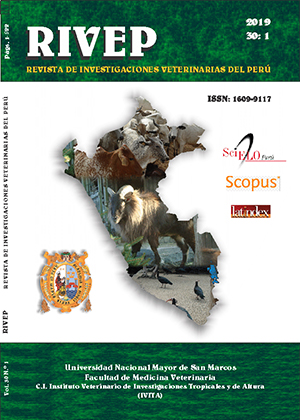Canine sperm thermoresistance in diluted fresh semen
DOI:
https://doi.org/10.15381/rivep.v30i1.15686Keywords:
canine semen; thermoresistance; skim-milkAbstract
In order to compare the effect of two types of seminal extenders, physiological saline (PS) and skim-milk (SM), on the functionality of canine spermatozoa in fresh semen subjected to a thermo-resistance test (TRT), 15 ejaculates were obtained by manual massage on the caudal portion of the bulb of the glans penis. Fifteen males, clinically healthy, of different small and medium breeds were used, all with proven fertility. The second fraction of each ejaculate was collected. The seminal evaluation considered progressive motility (PM) and membrane functionality with a simplified hypoosmotic test (HOST-s). Then, from each ejaculate, aliquots of 100 μl of semen were taken to be diluted in 200 μl of PS and SM respectively and then incubated at 38 °C for 30 minutes (TRT). As control, 300 μl of undiluted fresh semen was incubated. Next, PM and HOSTs were evaluated. The PM in the fresh semen was 81.4 ± 8.1 and the response to the HOST-t 94.0 ± 7.80, both values higher than those observed after the TRT in the diluted samples (p<0.05). However, when comparing both diluents after the TRT, no significant differences were observed: PS (PM: 71.0 ± 27.2 and HOST-s: 87 ± 10.5%) and SM (PM: 69.0 ± 18.5 and HOST-s: 86.0 ± 10.6%).
Downloads
Downloads
Published
Issue
Section
License
Copyright (c) 2019 Alfonso Sánchez Riquelme

This work is licensed under a Creative Commons Attribution-NonCommercial-ShareAlike 4.0 International License.
AUTHORS RETAIN THEIR RIGHTS:
a. Authors retain their trade mark rights and patent, and also on any process or procedure described in the article.
b. Authors retain their right to share, copy, distribute, perform and publicly communicate their article (eg, to place their article in an institutional repository or publish it in a book), with an acknowledgment of its initial publication in the Revista de Investigaciones Veterinarias del Perú (RIVEP).
c. Authors retain theirs right to make a subsequent publication of their work, to use the article or any part thereof (eg a compilation of his papers, lecture notes, thesis, or a book), always indicating the source of publication (the originator of the work, journal, volume, number and date).










